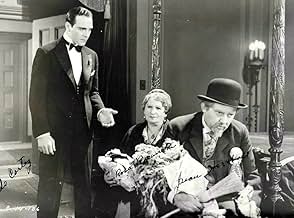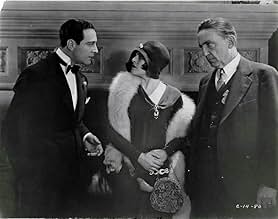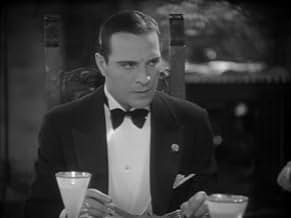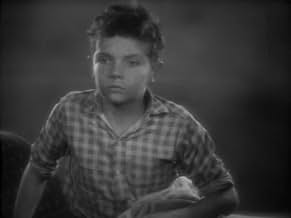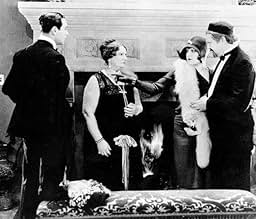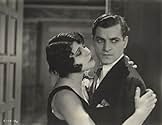Soap-opera about a social-climbing Jewish man and his old-world parents who are heartbroken by his rejection of them.Soap-opera about a social-climbing Jewish man and his old-world parents who are heartbroken by his rejection of them.Soap-opera about a social-climbing Jewish man and his old-world parents who are heartbroken by his rejection of them.
Syd Crossley
- Goldfish's Butler
- (as Sid Crossley)
Joe Bordeaux
- Crook
- (uncredited)
Ferike Boros
- Delancey Street Woman
- (uncredited)
Clarence Burton
- Police Desk Sergeant
- (uncredited)
Paul Ellis
- Crook
- (uncredited)
Otto Fries
- Tradesman
- (uncredited)
Julia Swayne Gordon
- Mrs. Striker
- (uncredited)
Donald Hall
- Minor Role
- (uncredited)
Leon Janney
- Eddie Lesser as a Boy
- (uncredited)
Julanne Johnston
- Irma Striker
- (uncredited)
Virginia Marshall
- Birdie Goldfish as a girl
- (uncredited)
Jack Raymond
- Pinsky
- (uncredited)
- Director
- Writers
- All cast & crew
- Production, box office & more at IMDbPro
Storyline
Did you know
- TriviaThe $1,000 Birdie sells Eddie's song for would equate to about $15,000 in 2019.
- GoofsWhen Birdie tells Eddie (via intertitle) that his song has been sold for $1000, he excitedly mouths the words "Five thousand?"
- Quotes
Title Card: New York's Lower East Side--a melting pot, where the younger generation struggles to free itself from the old-world ideas of its fathers.
- ConnectionsFeatured in Frank Capra's American Dream (1997)
Featured review
Based on a play by Fannie Hurst, The Younger Generation might be Frank Capra's most personal film up to this point. We've had films that felt like he was just for hire (Submarine and both the Harry Langdon films) and films where he was saying what he wanted to say (pretty much everything else to one degree or another), but this almost feels somewhat autobiographical. Sure, Capra was Italian and not Jewish, but it's about the immigrant experience and the difference between people who came to America as adults and those who were raised on its streets. Well, Capra was raised on those streets and had parents who moved to America as adults (he emigrated from Italy with his family when he was five years old), so this just feels like it should be personal.
The Goldfish family is living on the East Side of New York City while the mother Tilda (Rosa Rosanova) tries to make a living, the father Julius (Jean Hersholt) makes jokes with his friends on the street corner, little Birdie (Lina Basquette as an adult) makes friends with the boy across the way Eddie (Rex Lease as an adult), and the boy Maurice (Ricardo Cortez as an adult) with a real drive for business. When Maruice gets into a fight with Eddie, Maruice accidentally hits the oil lamp above the stove, sending the apartment up in a blaze, but he's not put out by it. He'll make money from their leftover possessions, setting the stage for him to build an import art empire roughly fifteen years later.
The core of the film's story is the implied conflict between the younger and older generations, but it's not quite the simplistic battle of the ages that that implies. Instead, it's a conflict of visions that mostly manifests as the dramatic butting of heads between Maurice and Birdie since the brother is obsessed with status and position in his new life while Birdie has kept up her relationship with Eddie to the point that she wants to marry him.
It's interesting to see the big guy versus little guy dynamic manifest here within a family unit with Maurice becoming the big guy, losing sight of his own humanity, and pushing away everyone else while controlling them with his money, much to the chagrin of everyone else in the family, in particular Julius and Birdie who act like partners in crime. Things turn when Eddie, in a fit of desperation to be good enough for Birdie in Maurice's eyes (I think, this is thin and needs more, to be honest), he helps some local hoods knock off a jewelry story by riding up on the street and singing a song to offer up a distraction. It's a scandal that gets quickly found out, leading to Birdie rededicating her love to him by marrying him and Maurice kicking her out while preventing his parents from knowing that he'd done it.
Now, I should comment on the fact that this is Capra's first sound film. Well, partial sound film. I don't know the background for sure, but it seems like it was at least mostly filmed, The Jazz Singer came out, and they went back to film four scenes with the new sound technology. The transition from silent to sound is the most interesting period in film, in my opinion, and one measure of a director's ability to adapt to changing circumstances. John Ford failed it with The Black Watch while Ernst Lubitsch passed with flying colors in The Love Parade. Capra falls more towards the Lubitsch side, though being only a part talkie there are limits to what one can say on that front. I just want to note that the four scenes are dialogue heavy scenes (similar to Hitchcock's first effort at sound, Blackmail), but he films it like any competent dialogue scene from the later pre-Code period would be filmed, complete with dialogue cutting into shots with people who aren't talking, helping to blend shots confidently. It's surprisingly well done stuff, and it happens to be in a pretty good story to boot. In terms of part-talkies, it recalled the confident way that William Wyler approached it in The Love Trap.
Anyway, the film speeds towards its conclusion after the passage of two years with Eddie in jail, Birdie having his child, and Julius reaches a low point in his health without any contact from his beloved daughter because Maurice is tearing up her letters all leading to the kind of warm-hearted resolution that Capra was known for, though this is tinged with some pointed sadness. It's not entirely happy, Maurice's antagonism towards Birdie gets somewhat resolved but he can't be happy, not even with his money. And that points to what has quickly formed to be Capra's running theme: the little guys prioritize things that the big guys don't, but there are things to be learned across that gap.
It's not a great film, perhaps more interesting for Capra's first foray into sound more than anything else, but it's a solidly entertaining little melodrama that never elevates the material but executes it with some skill.
The Goldfish family is living on the East Side of New York City while the mother Tilda (Rosa Rosanova) tries to make a living, the father Julius (Jean Hersholt) makes jokes with his friends on the street corner, little Birdie (Lina Basquette as an adult) makes friends with the boy across the way Eddie (Rex Lease as an adult), and the boy Maurice (Ricardo Cortez as an adult) with a real drive for business. When Maruice gets into a fight with Eddie, Maruice accidentally hits the oil lamp above the stove, sending the apartment up in a blaze, but he's not put out by it. He'll make money from their leftover possessions, setting the stage for him to build an import art empire roughly fifteen years later.
The core of the film's story is the implied conflict between the younger and older generations, but it's not quite the simplistic battle of the ages that that implies. Instead, it's a conflict of visions that mostly manifests as the dramatic butting of heads between Maurice and Birdie since the brother is obsessed with status and position in his new life while Birdie has kept up her relationship with Eddie to the point that she wants to marry him.
It's interesting to see the big guy versus little guy dynamic manifest here within a family unit with Maurice becoming the big guy, losing sight of his own humanity, and pushing away everyone else while controlling them with his money, much to the chagrin of everyone else in the family, in particular Julius and Birdie who act like partners in crime. Things turn when Eddie, in a fit of desperation to be good enough for Birdie in Maurice's eyes (I think, this is thin and needs more, to be honest), he helps some local hoods knock off a jewelry story by riding up on the street and singing a song to offer up a distraction. It's a scandal that gets quickly found out, leading to Birdie rededicating her love to him by marrying him and Maurice kicking her out while preventing his parents from knowing that he'd done it.
Now, I should comment on the fact that this is Capra's first sound film. Well, partial sound film. I don't know the background for sure, but it seems like it was at least mostly filmed, The Jazz Singer came out, and they went back to film four scenes with the new sound technology. The transition from silent to sound is the most interesting period in film, in my opinion, and one measure of a director's ability to adapt to changing circumstances. John Ford failed it with The Black Watch while Ernst Lubitsch passed with flying colors in The Love Parade. Capra falls more towards the Lubitsch side, though being only a part talkie there are limits to what one can say on that front. I just want to note that the four scenes are dialogue heavy scenes (similar to Hitchcock's first effort at sound, Blackmail), but he films it like any competent dialogue scene from the later pre-Code period would be filmed, complete with dialogue cutting into shots with people who aren't talking, helping to blend shots confidently. It's surprisingly well done stuff, and it happens to be in a pretty good story to boot. In terms of part-talkies, it recalled the confident way that William Wyler approached it in The Love Trap.
Anyway, the film speeds towards its conclusion after the passage of two years with Eddie in jail, Birdie having his child, and Julius reaches a low point in his health without any contact from his beloved daughter because Maurice is tearing up her letters all leading to the kind of warm-hearted resolution that Capra was known for, though this is tinged with some pointed sadness. It's not entirely happy, Maurice's antagonism towards Birdie gets somewhat resolved but he can't be happy, not even with his money. And that points to what has quickly formed to be Capra's running theme: the little guys prioritize things that the big guys don't, but there are things to be learned across that gap.
It's not a great film, perhaps more interesting for Capra's first foray into sound more than anything else, but it's a solidly entertaining little melodrama that never elevates the material but executes it with some skill.
- davidmvining
- Jan 11, 2024
- Permalink
Details
- Release date
- Country of origin
- Language
- Also known as
- Mlada generacija
- Filming locations
- Production company
- See more company credits at IMDbPro
- Runtime1 hour 15 minutes
Contribute to this page
Suggest an edit or add missing content

Top Gap
By what name was The Younger Generation (1929) officially released in India in English?
Answer
